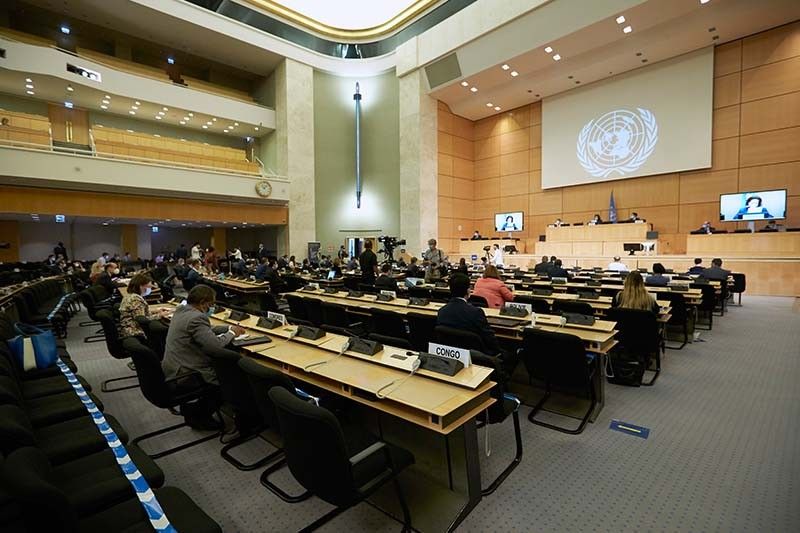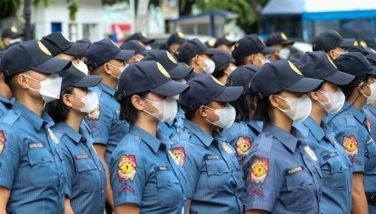China, Russia disagree with UN rights chief's report on Philippines

MANILA, Philippines — China and Russia—among the countries that the Philippines has been fostering better ties with under its new "independent foreign policy"—slammed the report of the Office of the United Nations High Commissioner on Human Rights on Tuesday, saying the findings were "politicized."
UN rights chief Michelle Bachelet presented her office’s report detailing “serious” human rights violations in the Philippines, including extrajudicial killings, to the UN Human Rights Council during its 44th session Tuesday.
Bachelet said these severe human rights abuses were results of the government’s war on drugs and the incitement to violence of top officials.
She called on the Human Rights Council to remain vigilant on the situation in the Philippines by mandating her office to continue monitoring and reporting.
She also said the council should consider options for international accountability measures if there will be an absence of clear outcomes from domestic mechanisms.
Responding to the rights’ chief reports, the European Union, Finland and Canada expressed deep concern on “widespread and systematic” killings from the government’s anti-drug campaign and attacks on press, religious leaders and indigenous peoples.
They asked Philippine authorities to investigate these rights abuses.
Russia: Countries must resolve rights issues themselves
Russia, however, found the consideration of the Philippine issue by the council a “clear example of politicization.”
“In the world, there is no state that is free from violations of human rights but they must resolve human rights issues themselves. The international community, meanwhile, must merely assist when it is requested and when there is consent,” Russia said.
“We cannot agree with the details in the report. The instruction addressed to the high commissioner from last year’s resolution does not stipulate objectivity or impartiality and it notes that there should not be politicization of the activities of the UN. The report indicates and demonstrates how counterproductive it is to continue this approach and we wish to end it,” it added.
According to New York-based Human Rights Watch, the human rights situation in Russia "continued to deteriorate" in 2019, saying that "with few exceptions, authorities responded to rising civic activism with bans, repressive laws, and showcase prosecutions."
It noted reports of harassment and prosecution of environmental defenders and said "the government introduced new restrictions to online speech and adopted a law that could allow it to isolate the Russian segment of the internet."
Bachelet's report was mandated by a resolution adopted by the UN Human Rights Council in July 2019. Out of the 47-member council, 18 voted in favor of the resolution tabled by Iceland. Fourteen member states—including China—voted against the resolution while 15 abstained.
China: Don't pressure states
China said it is against using a country’s resolution to exercise pressure on member states.
“In our view, the OHCHR should stick to the principle of impartiality and objectivity in its work, respect efforts by member states to promote and protect human rights, attach importance to the authoritative information provided by the member state’s government, do away with prejudice and prejudgment and engage in constructive dialogue and cooperation with the member state’s government,” it said.
It added it has a “positive” assessment of the Philippines’ efforts in promoting economic development, eliminating poverty and ensuring people’s human rights and that it supports the government’s law enforcement actions to fight drug crimes and maintain security.
According to rights group Amnesty International, the human rights situation in China in 2019 "continued to be marked by a systematic crackdown on dissent."
"The government continued to intimidate, harass, and prosecute human rights defenders and independent NGOs, including raids on their homes and offices. Human rights defenders’ family members were subjected to police surveillance, harassment, detention and restrictions on their freedom of movement," Amnesty International also said.
Latest government figures put the number of alleged drug personalities killed in the Philippines' "war on drugs" at 5,601. But it is significantly lower than the estimates by human rights watchdogs of as many as 27,000 killed.
The Philippines began expanding its relationship with Moscow and Beijing and lessening its historical dependence on Washington when President Rodrigo Duterte assumed office in 2016.
The United Nations Human Rights Council will hold its 44th regular session from June 30 to July 20 at the Palais des Nations in Geneva, Switzerland.
- Latest
- Trending

































